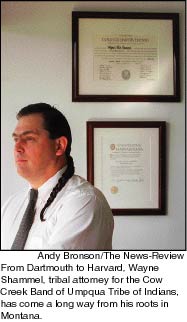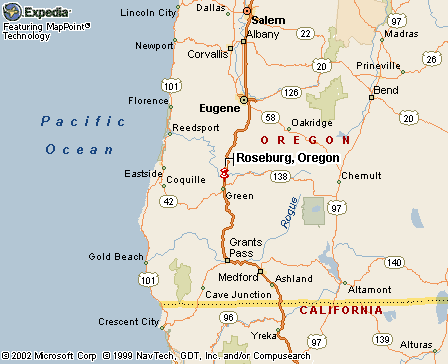|
|
Canku Ota |
|
|
(Many Paths) |
||
|
An Online Newsletter Celebrating Native America |
||
|
March 23, 2002 - Issue 57 |
||
|
|
||
|
A Champion of Indian Causes |
||
|
by Stacy D. Stumbo The
Oregon News-Review March 4, 2002
|
||
|
credits: Andy Bronson
The Oregon News-Review
|
 Looking
at a map marking every American Indian reservation in the United States,
34-year-old attorney Wayne Shammel points to the scattered red dots and
wonders at the scarcity and distance between these places he calls "Indian
Country." Looking
at a map marking every American Indian reservation in the United States,
34-year-old attorney Wayne Shammel points to the scattered red dots and
wonders at the scarcity and distance between these places he calls "Indian
Country."
A commitment to his own ancestry and the well-being of these tribes prompted Shammel to champion their causes using Indian law. He has worked for the Cow Creek Band of Umpqua Tribe of Indians for 10 years, eight of them in Roseburg. His work philosophy is simple, "be a servant for the tribe's needs first, and a lawyer second." Tribal Chairwoman Sue Shaffer has found Shammel to be both brilliant and dedicated. "But more than that," she said, "he's a wonderful human being." Raised on a ranch on the Flathead reservation in Montana, he is one of some 8,000 members of the Confederated Salish and Kootenai Tribes. Shammel said he always knew he wanted to make a difference. In his sophomore year in high school, he met the first lawyer to come out of his tribe. This attorney preached advocacy for American
Indians and their need for representation. Shammel said it might seem
a cliché, but he was seized by a desire to meet those challenges.
After all, his heroes were men who fought Brant and Shammel have something in common. Both attended Moor's Charity School for Indians in Connecticut. In Shammel's time, it was called Dartmouth College. Shammel said over its 200-year history, only about 80 American Indians received degrees from Dartmouth. By the time he enrolled, the college was "actively seeking top Indian students," he said. Though there were many American Indians in his class, Shammel said there was a 50 percent attrition rate. "Coming from a reservation to an Ivy League school can be a rough adjustment," he said. After receiving degrees in English and comparative literature, he entered Harvard Law School where the atmosphere was "intensely competitive," he said. He was fascinated by Indian law, but found few opportunities to cultivate that interest. Even at that time there was only one course in the study, he said. "I wanted to learn the traditional Indian law areas (related to sovereignty), and expand the reach of what tribes can do." Although he received academic scholarships, by the time he finished, Shammel amassed about $120,000 in student loans. "I left school with nothing more than a huge debt, a shotgun, a dog and a pickup," he said. Eager to pay off those loans, he got a job with a Denver law firm. He worked on corporate mergers and occasionally represented tribal interests. It was while working on the Indian Motorcycles trademark case that he became involved with the Cow Creek Band. Like a detective searching for clues, Shammel has immersed himself in studying and interpreting laws that could help tribes in ways they'd never imagined. Not a simple task, since most laws were not written with tribal needs in mind. "As a result, there are massive unexplored
regions of the law," he said. His discoveries brought Shammel acclaim
within the legal community as well as personal satisfaction. He is particularly
interested in taking common law, or "That's the whole fun of it," he said. "The thrill of doing something that's never been done, with the conviction that you're doing something good for good people." Shammel frequently lectures at Oregon Continued Legal Education programs, sharing his understanding of Indian issues. Shammel said he's participated in many interesting
cases since becoming involved with the Cow Creeks. He appreciates the
struggle of the forgotten tribe that reclaimed its identity through
Congressional recognition two "They never disappeared but they were supposed to," he said. The Cow Creeks don't have a reservation in the classical sense. The one promised the tribe was taken in the 1850s. The modern band is creating a new reservation with what Shammel calls "invisible boundaries" consisting of property purchased by the tribe. Something of a joker, he likes to facetiously remind visitors to the Cow Creek Government Offices on Northeast Stephens Street in Roseburg to have their "reservation pass validated before they leave." When they respond, "What pass? I didn't know I needed a pass." He replies, "Oh, then I'm afraid your car has probably been towed." A divorced father of three, Shammel makes his home near Melrose. His daughters Cassie, 7, and Katie, 6, live in Roseburg. His 8-year-old son Jadiamon lives in Phoenix. "My kids love it, and I'm happy here," he said. "It's very fertile soil to transplant roots. I like elk hunting and camping, and being outdoors. But most of all, I love jet boating." The Cow Creeks have become like family, he said. His daughters call Shaffer "Grandma Sue." Shaffer said the family atmosphere is ingrained in the office. "The children are always welcome in the office," she said. "We're all very close. It seems so natural." Shammel insists he will continue with the tribe for as long as it will have him. Staring at his daughters' pictures, which hang above the desk in his small office he sighed, "I try to keep my priorities straight. It's pretty easy to do when I look at their faces."
|
||||
|
|
||
|
|
||
| Canku Ota is a free Newsletter celebrating Native America, its traditions and accomplishments . We do not provide subscriber or visitor names to anyone. Some articles presented in Canku Ota may contain copyright material. We have received appropriate permissions for republishing any articles. Material appearing here is distributed without profit or monetary gain to those who have expressed an interest. This is in accordance with Title 17 U.S.C. section 107. | ||
|
Canku Ota is a copyright © 2000, 2001, 2002 of Vicki Lockard and Paul Barry. |
||
|
|
|
|
|
The "Canku Ota - A Newsletter Celebrating Native America" web site and its design is the |
||
|
Copyright © 1999, 2000, 2001, 2002 of Paul C. Barry. |
||
|
All Rights Reserved. |
||

